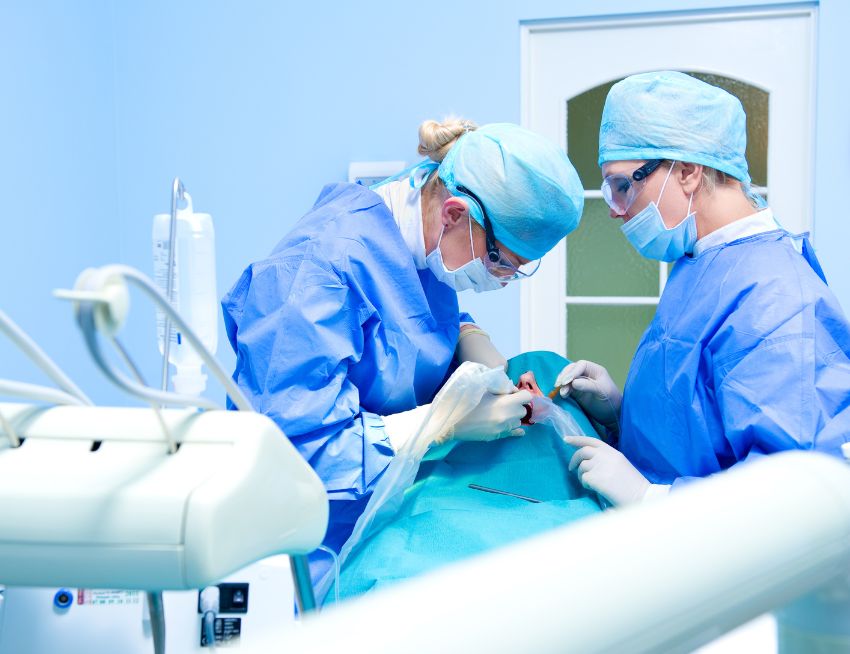Dental implants have become a popular solution for replacing missing teeth. While the process of getting a dental implant is relatively straightforward, there are a few important things to keep in mind during the healing stages.
Here’s what you can expect during the dental implant healing process.
Dealing implant healing stages – What to expect
Stage 1: Osseointegration
Osseointegration is a critical stage in the dental implant healing process, as it is during this stage that the implant fuses with the jawbone.
This process typically takes several weeks to a few months to complete, and during this time, it is important to take extra care of the implant site to ensure successful healing.
Any unnecessary pressure on the implant site should be avoided, as it can cause the implant to shift or even fail. It is also essential to maintain good oral hygiene during this stage, as a clean and healthy mouth can help promote healing.
Patients should continue to brush and floss regularly but be sure to avoid the implant site while it heals. Additionally, smoking should be avoided during this stage, as it can slow down the healing process and increase the risk of implant failure. Ultimately, by following these guidelines and taking good care of the implant site, patients can help ensure a successful osseointegration process and achieve a fully restored smile.
Stage 2: Abutment placement
After the osseointegration process is complete, the next step in the dental implant healing process is to attach the abutment to the implant.
The abutment is a small connector that joins the implant to the crown or denture. This is a less invasive procedure than the initial implant placement and typically only takes a few days to heal.
During the abutment placement stage, it is essential to continue following good oral hygiene practices and avoid putting pressure on the implant site. Your dentist may recommend that you eat soft foods for a few days after the procedure to prevent irritation of the area.
It is also important to note that abutment placement is a custom process. Your dentist will take impressions of your teeth and implant to create an abutment that fits perfectly. Once the abutment is in place, your dentist may also take additional X-rays or scans to ensure the abutment is correctly positioned before proceeding with the final stage of the process.
Overall, while abutment placement is relatively quick and painless, it is still important to take care of the implant site during the healing process. By following your dentist’s instructions and avoiding any unnecessary pressure on the implant site, you can ensure successful healing and prepare for the final stage of the process.

Stage 3: Crown Placement
After the abutment has healed, the final step is to place the crown on the implant. The crown is the visible portion of the implant, and it’s designed to look and function like a natural tooth. This process is typically quick and painless, and most patients are able to resume normal activities immediately after the procedure.
However, it’s still important to take care of the implant site after the crown has been placed. This means practicing good oral hygiene, avoiding hard or sticky foods, and scheduling regular check-ups with your dentist.
The Importance of Good Oral Hygiene During the Dental Implant Healing Process
The dental implant healing process is a critical time for anyone who has undergone dental implant surgery. During this period, it’s essential to maintain good oral hygiene to ensure that the implant heals correctly and is not at risk of infection or other complications.
Why is good oral hygiene important during the dental implant healing stages?
Firstly, a dental implant is a foreign object in your mouth, and the gum tissue and bone surrounding the implant will need time to integrate and heal. Maintaining good oral hygiene practices such as brushing, flossing, and rinsing with an antiseptic mouthwash can help keep the area around the implant clean and prevent infection.
Secondly, poor oral hygiene during the healing process can lead to a condition called peri-implantitis. This is an inflammatory response that occurs when bacteria accumulate around the implant site, causing infection and inflammation. If left untreated, peri-implantitis can cause the implant to fail, requiring removal.
Thirdly, good oral hygiene can help prevent complications such as implant rejection. In some cases, the body may reject the implant, causing it to fail. However, maintaining good oral hygiene can help reduce the risk of rejection by minimizing the risk of infection and inflammation.

Here are some tips for maintaining good oral hygiene during the dental implant healing process:
- Brush your teeth twice a day using a soft-bristled toothbrush. Be gentle around the implant site to avoid disrupting the healing process.
- Floss daily to remove food particles and plaque from between your teeth and around the implant site. Use a floss threader to get around the implant post.
- Rinse your mouth with an antiseptic mouthwash to kill bacteria and promote healing. Avoid using mouthwash that contains alcohol, as this can irritate the implant site.
- Avoid smoking or using tobacco products, as these can delay healing and increase the risk of implant failure.
- Visit your dentist regularly for check-ups and cleanings. Your dentist can monitor the healing process and address any issues before they become more significant problems.
Remember that good oral hygiene is crucial during the dental implant healing stages. By taking proper care of your implant and surrounding tissue, you can minimize the risk of infection, inflammation, and implant failure. Remember to follow your dentist’s instructions for post-operative care and maintain a consistent oral hygiene routine to ensure a successful outcome.
Conclusion
While the dental implant healing process may seem daunting, it’s important to remember that the end result is a fully restored smile that looks and functions just like natural teeth. By following your dentist’s instructions and taking good care of the implant site, you can ensure successful healing and long-lasting results.
If you have any questions, contact our dental clinic in Hungary which is the perfect country to save on dental treatments such as getting your dental implants.


